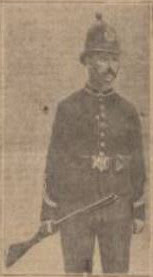Featured
- Get link
- X
- Other Apps
Locomotion for Dorset Superintendents
During the First World War transport for the Superintendents in Dorset Constabulary was discussed by the Dorset Standing Committee. Historically the Superintendents had used horses and carts to get around their areas, these were stabled and looks after by a constable. With the advent of motor bikes and cars, the police looked at these forms of transport to increase their efficiency. It should be remembered that though motorised transport was faster than horses they were restricted to a maximum of 20 miles per hour. How times have changed.
 |
| This photograph was in the family collection, I have no idea where or why this was taken and kept but perhaps someone will recognise it |
Replace Worn-out Horses with Motor-Cycles
In May 1916, the Chief Constable Captain Granville reported, some of the horses used by the Superintendents were worn-out. Due to the difficulty of obtaining suitable animals, he was now four horses short, which made it very difficult for the Superintendents to carry out their work. He asked that the two of his Superintendents be provided with motor-cycles, both were active men. At this time the cost of a motor-cycle was similar to the cost of a horse. After a considerable amount of discussion the committee agreed to provide motor-cycles for the Superintendents of Portland and Sturminster Newton. The choice and purchase of the machines to be left to a sub-committee. The dog-carts were to be retained so a horse could be hired should the need arise.
At the July meeting the Chief Constable reported that he had obtained a two and three quarter horse power Douglas motor-bicycle for the Superintendent at Portland. This cost £50 8s and had been ridden since the 6th June, the Superintendent had found it a most satisfactory for his work. It was agreed that two similar machines would be purchased for the use of the Superintendents at Sturminster Newton and Wareham.
Cost of Feeding the Horses
In February 1917 the Chief Constable asked the committee to consider a request from his Superintendents with horses. Due to the increase in costs, since the start of the war, the allowance for the purchase of forage was insufficient. Police horses had the same daily allowance as the military horses which was 10lbs oats, 12lbs. Hay, and 8lbs straw. The Superintendents received 2s 2d a day, the Chief Constable estimated the cost of these rations was now 2s 9d per day. The increase of 7d per day was agreed.
Motorised Locomotion
After the war had ended in March 1919 Grandad Beck with Superintendents Sprackling and White asked the committee to provide means of locomotion other than motor cycles, which they alleged had proved unsatisfactory for conveniently getting about their Divisions. The report doesn't say why they were unsatisfactory but the matter was deferred, as summer was coming.
Changes to Divisions
Nearly a year after the war had ended in October 1919, the Chief Constable wanted to reduce the number of divisions, from 10 to 8. He bought before the committee recommendations that the Sherborne Division be joined with the Shaftesbury Division. It was also purposed that the Sturminster Newton Division was joined with the Blandford Division. An Inspector would be stationed at Sherborne and Sturminster Newton, reporting to the respective Superintendents. After the changes the divisions were at Blandford, Bridport (stationed at Beaminster), Dorchester, Portland, Shaftesbury, Wareham, Wimborne, and Poole. The changes to the Divisions were agreed to and the following month Grandad Beck was moved to Beaminster. At least he wouldn't have to ride a motor-cycle, as Beaminster Division had two horses for the large hilly area.
The Chief Constable further requested that the Superintendents of the enlarged divisions be provided with a Motor-car. Colonel Colfox, reminded the committee that seven carts and seven horses and eight motor-bicycles were provided for the Superintendents. Also a motor-bicycle and side-car was provided for the Deputy Chief Constable at headquarters. In the view of the Chief Constable, the cost of adoption of motor-cars would be considerably cheaper to maintain than the current cost of horses, forage and other items. Motor-cars would also be more efficient and useful for the police work. The Chief Constable recommended the purchase of motor four-seater cars for all the divisions except Poole, and one for Headquarters. Members of the committee felt the purchase of motor-cars was too expensive at that time. Mr. Webb thought they ought to refrain from pampering the police any further. The motion was proposed and carried that the purchase of motor-cars for the police be postponed for twelve months. The Chief Constable would need to purchase two horses, to replace those he was short. I wrote about the eventual solution to this issues in my post entitled The "Vexed Question" of Motor-cars for Superintendents of Police
All original content by Sylvia Collins is copyright protected.
Ref: Quotes in italics Headings taken from the newspapers
Western Gazette: 1916 5 May p6 and 21 July p6; 1917 2 February p6; 1919 21 March p8 and 17 October p9
- Get link
- X
- Other Apps
Comments
Popular Posts
The Wilfully and Malice Murder of Winifred Mitchell
- Get link
- X
- Other Apps


[…] Superintendent’s also had problems with their allowances for feeding their horses and prisoners. In October 1916 the superintendents allowance for the subsistence of prisoners whilst in custody was discussed. They were given half-pence per hour while a prisoner was in custody, which was not enough to cover the increased cost of the meals. Each prisoner received 12 ounces of bread and 2 ounces of cheese three times a day, 8am, 1pm and 5pm. A pint of tea or coffee at 8am and 5pm. The committee agreed to double the allowance. I wrote about the forage for the horses last week in Locomotion for Dorset Superintendents. […]
ReplyDelete